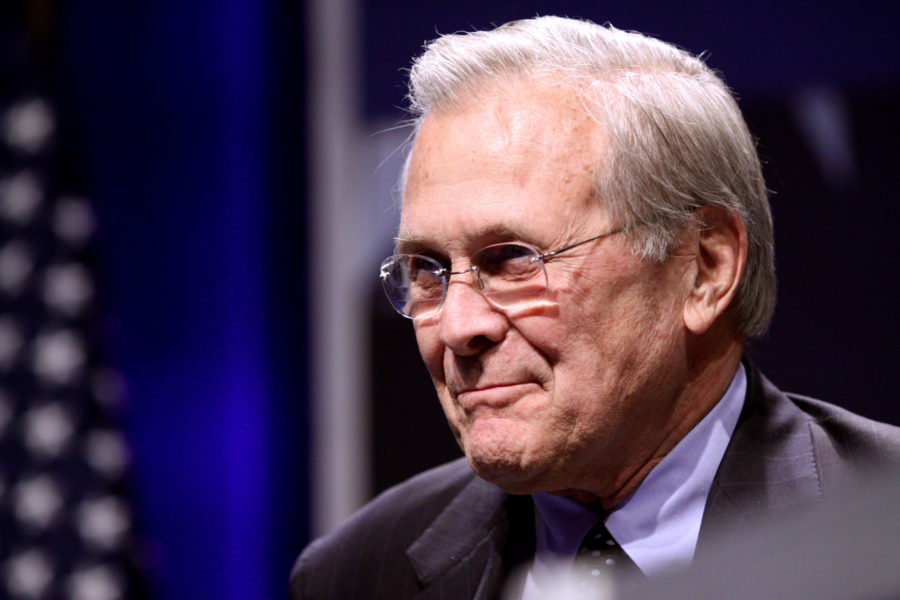Donald Rumsfeld, who made history as the first man to serve as Secretary of Defense for two Presidents and oversaw the beginning of U.S. wars in Iraq and Afghanistan, died June 30 in Taos, N.M., his family announced on social media. He was 88.
In a career in government spanning decades, Rumsfeld served as a congressman from Illinois’ 13th District, director of the Office of Economic Opportunity, U.S. Ambassador to NATO, and White House Chief of Staff, in addition to his two stints as Defense Secretary. He was a Cabinet-level aide of President Richard Nixon before becoming the youngest Defense Secretary ever under Gerald Ford in 1975. He then returned to the Pentagon as the second-oldest person ever to lead it, in 2001 under George W. Bush.
“I was saddened to hear today of the passing of former Secretary of Defense Donald H. Rumsfeld,” current Secretary of Defense Lloyd J. Austin III said in a written statement issued by the Pentagon. “Mr. Rumsfeld had the singular distinction of holding that post for two nonconsecutive tenures, serving as both the 13th secretary of defense and the 21st. He also served in the U.S. Navy in 1954-57 as a pilot and a flight instructor, and he continued his service as a reservist until 1975, when he became secretary of defense for the first time.
“Over the decades of his remarkable career, from Congress to the White House to the Pentagon, Secretary Rumsfeld was propelled by his boundless energy, probing intellect, and abiding commitment to serve his country. On behalf of the Department of Defense, I extend my deep condolences to his family and loved ones.”
Rumsfeld’s second tenure in the Pentagon coincided with one of the most consequential periods in modern American history. After the terrorist attacks of Sept. 11, 2001, Rumsfeld oversaw the planning and execution of wars in the Middle East that wound up lasting years. More than 6,000 American troops have died in the region since, and estimates have pegged the financial cost in the trillions of dollars.
Rumsfeld claimed Iraqi dictator Saddam Hussein possessed weapons of mass destruction in explaining the Bush administration’s justification for an invasion of the country. No such weapons were ever found, and he would admit years later to making “misstatements” on the topic.
Rumsfeld also became embroiled in the controversy surrounding torture and prisoner abuse in Abu Ghraib, Iraq, and subsequent revelations about “enhanced interrogation techniques” used by the U.S. government at Guantanamo Bay, Cuba.
In the Middle East, Rumsfeld deployed a strategy of smaller, more mobile ground forces with a reliance on more airstrikes, moves that were dubbed by some as the “Rumsfeld Doctrine.” But as the wars dragged on, he came under increasing criticism, culminating in a number of retired generals and admirals publicly calling on him to resign in 2006. While President Bush initially defended him, Rumsfeld resigned after the ’06 midterm elections.
“Secretary Donald Rumsfeld was an exceptional leader who dedicated decades of his life in public service to this nation,” said Rep. Mike Rogers (R-Ala.), Ranking Member of the House Armed Services Committee, in a statement. “On Sept. 11, 2001, Donald was there to help lead our nation out of one of our darkest days, including running into the Pentagon to assist the wounded and survivors. I also appreciate his help to lay some of the early groundwork for the Space Force. He was an extraordinary man and his loss will be deeply felt. I extend my deepest condolences to the Rumsfeld family and his wife Joyce as they mourn his passing.”
